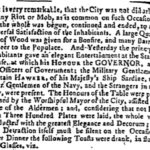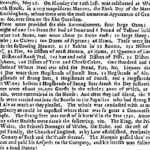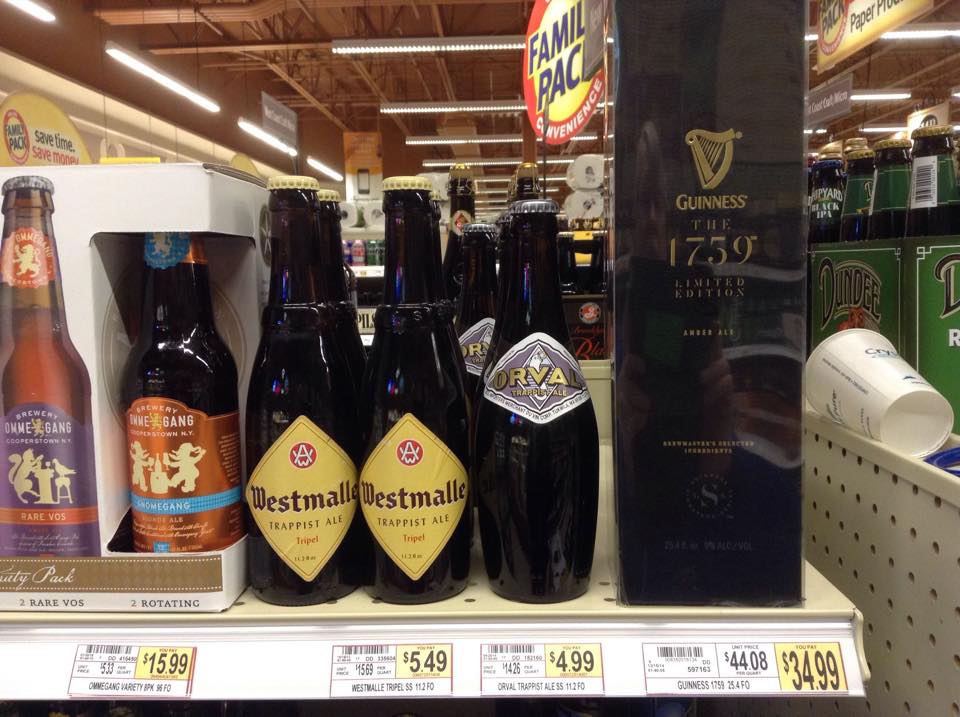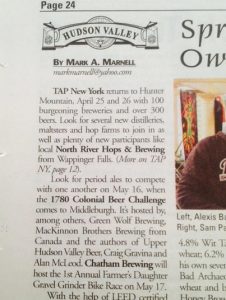 As a careful reader of this blog may have picked up, I have a certain preference for the pre-lager pre-Victorian world of British Empire beer – if only because it’s so widely ignored. As beer writers and nano brewers are now painfully aware, too many claims against too little content makes for thin rewards. Always best to specialize where no generalists have yet trod as far as I’m concerned. In our book Ontario Beer, Jordan and I came across many such areas of unexplored history – much to our surprise. Turned out that no only had the province’s brewing history been little explored but there was no set of competing books, no library shelf filled with books even on the topic of this colony and province’s general history. A shame. But a gap we were happy to take some small steps to help fill.
As a careful reader of this blog may have picked up, I have a certain preference for the pre-lager pre-Victorian world of British Empire beer – if only because it’s so widely ignored. As beer writers and nano brewers are now painfully aware, too many claims against too little content makes for thin rewards. Always best to specialize where no generalists have yet trod as far as I’m concerned. In our book Ontario Beer, Jordan and I came across many such areas of unexplored history – much to our surprise. Turned out that no only had the province’s brewing history been little explored but there was no set of competing books, no library shelf filled with books even on the topic of this colony and province’s general history. A shame. But a gap we were happy to take some small steps to help fill.
Through our research, one thing I really came to understand was how what is now Ontario not only has a Victorian past but also Georgian, Stuart and even Baroque ones. One favorite book I came across was The Annals of the Town of Guelph, 1827-1877 by Charles Acton Burrows. In that book there are a few passages, one of which I mentioned here, that describe the pre-lager pre-Victorian drinking habits on the Upper Canadian frontier. Here is a more complete description of the events of 12 August 1827 at Guelph:
It was now the month of August, and the 12th being the king’s birthday, and also the anniversary of the formation of the Canada Company, he determined to celebrate it by a general holiday and public dinner….On the Monday morning the town was in a state of the greatest excitement, it being determined to roast an ox whole on the market place, and have a right jovial time generally, in which they appear to have succeeded. Early in the morning four huge posts, which remained as a memento for many years, were let into the ground, from which, by means of logging chains, the carcase was suspended, an immense log fire being kindled on each side. While the ox was roasting a large number of guests, who had been specially invited by Mr. Galt to take part in the festivities… When dinner time had arrived the roasted ox was carried into the market house, and placed upon a strong table, where it was carved ,and the guests, to the number of about two hundred, enjoyed a right royal feast… the first thing to be done to lend an air of refinement to the meal, was to provide forks, which each man did for himself, by going to the lumber pile and selecting or cutting a suitable stick, whitling a fork out of it with his jack knife, which indispensable article every man of course had with him, and with which he afterwards cut up his beef. Plates being somewhat scarce, and the few possessed in the town being far too valuable to risk at such a gathering, each selected as clean a shingle as possible, from the pile, which remained after the market house roof had been finished, and with keen appetites all sat down and enjoyed a hearty meal. “After the cloth was removed,” toasts were drunk to everybody and every conceivable thing, the liquors, of all imaginable descriptions, being passed round in buckets, from which each man helped himself by means of tin cups, about two hundred of which had been supplied for the occasion…
…those who remained continued to celebrate the day in an exceedingly hilarious manner, most of them, who had not succumbed to an overpowering somnolency, celebrating the night too, many of them being found next morning reposing on the ground in the market place, in loving proximity to the liquor pails, in which conveniently floated the tin cups. This celebration was taken hold of by the fault finders, not on account of the quantity of liquor consumed, for that was a mere trifle in those days, and an indispensable adjunct to such an occasion, but because they asserted that the health of Sir Peregrine Maitland, the Lieutenant Governor, had been omitted from the list of toasts.
And here is another from the celebration of the laying of the foundation of the community’s first school house:
A few fights brought the public proceedings to a close, when the elite adjourned to the Priory, where a dinner on a somewhat grand scale had been prepared. Mr. Galt presided, the vice chair being filled by Dr. Dunlop, and about eighty guests being present. What followed the removal of the cloth it is not necessary particularly to describe, but
“The nicht giew on wi sangs an clatter,
“An* aye the ale was growing better,”
As the “wee sma hours” approached some of the guests grew a little pugnacious, and Thomas Brown, the father of Miss Letitia, acting as constable pro tem, was called on to quell the disturbance, and in his attempts to restore peace had his hand badly cut by a carving knife in the hands of one of the rioters. He was consequently disabled from working for some time, and was therefore appointed to the honorable position of “grog boss” among the Company’s workmen, the duties of which he filled to the entire satisfaction of the men.
Such times. Such foreign times. Dr. William “Tiger” Dunlop is among my favorite early Ontarians. He was born in my father’s home city of Greenock so I was raised on stories of his life… or at least I was in the room when things were stated even if I only paid half the attention I should have. In 1827-28 when the stories above unfolded, Dr. Dunlop is in his third year as a senior official of the Canada Company. John Galt is the enterprise’s founder, corporate secretary and first superintendent. When these men were carving farming settlements out of the forest which had fed the Ojibwe who had lived there, here was a great deal of strong drink in Upper Canada – including a wide range of ales if you could get your hands on them. As we noted in the book, the roads were bad and beer was heavy. Much of it was strong. Thirty years later, in 1858, courts ruled in nearby New York that lager was not intoxicating because of its lack of a strength. Which means what came before most likely was quite intoxicating.
All of which is presented to you in response to one point Jordan made in relation to his recent and by all accounts excellent recreation of an 1832 mild ale from Helliwell‘s, a brewery located in what is now Toronto. In his weekly article, Jordan also states that the function of the 9.1% beer was its caloric strength and
it explained why Helliwell only ever mentions having “a glass of beer” in his diaries. Two of them would put your lights out.
This my only quibble. While Helliwell the brewer may have liked a glass and the calories were important, I am pretty sure that what we now consider intemperate drinking was common and socially acceptable – even perhaps socially required and welcomed. Soon, the scales would tilt as the new settlers become established and by the 1850s are creating a middle class with its new values and interest in spawning reforms. Temperance starts to become a measure of one’s virtue. But even at the highest levels it is many decades before that is the new normal. Even in the mid-1860s, Canada’s founder Sir. John A. Macdonald, whose law career began in the last Georgian years, led a debate on constitutional changes needed to bring Confederation into being while being “on a spree” and “half drunk” as well as “quite drunk with potations of ale.” It is hard to imagine a century and a half later. It is probably good that it is hard to imagine. But there is every reason to understand that a fair share of those who created this create land were half schgoggled from what can only be considered wild-eyed barrel draining a significant part of the time.
Thank God for the temperance movement. It saved us all from our forefathers’ ways. Jordan has more of the story in his new book Lost Breweries of Toronto. You really need the whole set, right?
 Eight years on and still we read about the abomination of green beer, the correct spelling of the drunken holiday and holiers than holy insisting Guinness is not what it was. Lecturing. Nothing like keeping it dull, craft. Way to go.
Eight years on and still we read about the abomination of green beer, the correct spelling of the drunken holiday and holiers than holy insisting Guinness is not what it was. Lecturing. Nothing like keeping it dull, craft. Way to go. matching baseball jerseys, white with green pin stripes. Their jerseys were both numbered “17” and the name above the number was “WASTED” on both. I expect they already were. By noon, they have gathered in herds. Tomorrow I shall rise early, just about when I trust they will be hitting the hay… or the floor… or wherever.
matching baseball jerseys, white with green pin stripes. Their jerseys were both numbered “17” and the name above the number was “WASTED” on both. I expect they already were. By noon, they have gathered in herds. Tomorrow I shall rise early, just about when I trust they will be hitting the hay… or the floor… or wherever.









